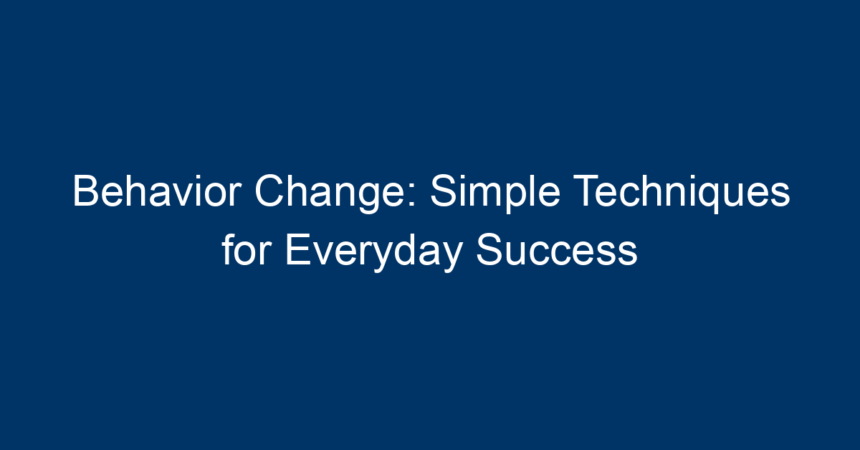In a fast-paced world filled with endless distractions and demands, behavior change can seem like a daunting task. Whether you aim to adopt a healthier lifestyle, increase productivity, or cultivate positive habits, altering your behavior requires not just willpower but effective techniques tailored for everyday success. This article will provide you with actionable insights and simple strategies to help you navigate the intricate landscape of behavior change.
Understanding Behavior Change
Behavior change is the process of transforming an individual’s actions and habits to achieve specific outcomes. This transformation can be motivated by personal goals, health concerns, environmental influences, or social pressures. While the idea of change can be intimidating, understanding the underlying psychology makes it more approachable.
The Stages of Behavior Change
A commonly recognized model in behavior change is the Transtheoretical Model, which outlines five stages:
- Precontemplation: Not yet considering change.
- Contemplation: Acknowledging the need to change.
- Preparation: Planning to change behaviors.
- Action: Modifying behaviors and taking tangible steps.
- Maintenance: Sustaining the new behavior over time.
Recognizing where you fit within these stages can provide clarity and direction for your efforts.
Establish Clear Goals
Setting clear, specific goals is essential for effective behavior change. When your objectives are well-defined, you increase the likelihood of success.
SMART Goals
A popular method for goal-setting is the SMART criteria:
- Specific: Your goal should be clear and specific.
- Measurable: You should be able to track your progress.
- Achievable: Set realistic goals.
- Relevant: Ensure the goal aligns with your broader objectives.
- Time-bound: Set a deadline for achieving your goal.
By utilizing the SMART framework, you can cultivate a strong foundation for behavior change.
Identify Triggers
Every behavior is a response to specific triggers or cues. Understanding these triggers can significantly enhance your ability to modify your actions.
Self-Reflection
Practicing self-reflection enables you to recognize patterns in your behavior. Ask yourself:
- What situations prompt me to engage in undesirable behaviors?
- How do I feel before and after these actions?
By identifying triggers—like stress, boredom, or environmental factors—you can develop strategies to counteract them.
Eliminate Negative Triggers
Once you recognize your triggers, consider ways to eliminate or minimize them. For instance, if you feel tempted to snack when watching TV, try changing your environment or engaging in different activities.
Develop Positive Habits
Creating positive habits is central to successful behavior change. By focusing on building habits rather than merely stopping bad ones, you create a more sustainable change.
The Habit Loop
According to Charles Duhigg’s "The Power of Habit," habits are formed through a three-step loop: cue, routine, and reward.
- Cue: Identify what triggers your habit.
- Routine: Establish a new behavior that replaces the old habit.
- Reward: Reinforce the new behavior with a satisfying reward.
For example, if you’re trying to quit smoking, you could identify stress as a cue. Instead of reaching for a cigarette, you might adopt deep-breathing exercises as your new routine, followed by a reward of a relaxing activity.
Incorporate Accountability
Accountability can serve as a powerful tool for change. Having someone to support you or even join you in your journey can make the process more enjoyable and effective.
Find an Accountability Partner
An accountability partner can be anyone who shares similar goals—friends, family, or colleagues. Regular check-ins can help keep you committed. A small nudge from someone else can provide the extra motivation needed when enthusiasm wanes.
Use Technology
In today’s digital age, various apps can help track your progress and keep you accountable. From fitness trackers to productivity apps, technology can play a significant role in supporting your behavior change journey.
Embrace Mindfulness
Mindfulness is a powerful practice that can enhance your ability to change behaviors. It encourages you to become more aware of your thoughts, feelings, and surroundings, allowing you to make more conscious choices.
Practicing Mindfulness
Incorporating mindfulness into your daily routine can be straightforward. Here are a few techniques:
- Breathing Exercises: Take a few minutes each day to focus solely on your breathing. This can help reduce stress and improve clarity.
- Mindful Eating: Pay close attention to what you consume. Savor each bite and listen to your body’s signals.
- Journaling: Reflecting on your thoughts and experiences can help you understand your motivations and behaviors.
By cultivating mindfulness, you can better navigate your emotional landscape and make intentional choices that align with your goals.
Create a Supportive Environment
Your surroundings greatly influence your ability to enact behavior change. By creating an environment that supports your goals, you set yourself up for success.
Declutter and Organize
Physical clutter can lead to mental clutter. Organize your space to minimize distractions and temptations. For example, keep healthy snacks visible and accessible while storing junk food out of sight.
Surround Yourself with Positivity
Choose to surround yourself with supportive and positive influences. Engage with people who inspire you and distance yourself from negativity that may impede your progress.
Celebrate Small Wins
As you embark on your journey toward behavior change, remember to celebrate small victories along the way. Acknowledging these wins can boost your motivation and reinforce your commitment.
Reward Yourself
Implement a reward system for achieving milestones—whether they’re big or small. This could be as simple as taking a day off, treating yourself to your favorite meal, or engaging in a fun activity.
Conclusion
Achieving lasting behavior change doesn’t have to be an uphill battle. By implementing these straightforward techniques—like setting SMART goals, understanding your triggers, developing positive habits, and utilizing accountability—you can create a roadmap toward your desired changes. Remember that success takes time and effort, so be patient and compassionate with yourself.
The journey of behavior change is not a sprint; it’s a marathon. With determination and the right strategies, you can pave your way to everyday success, transforming not just your habits, but your life as a whole. Start today by selecting one technique that resonates with you, and take the first step toward a brighter, healthier future.




